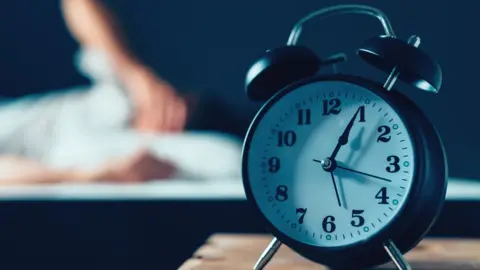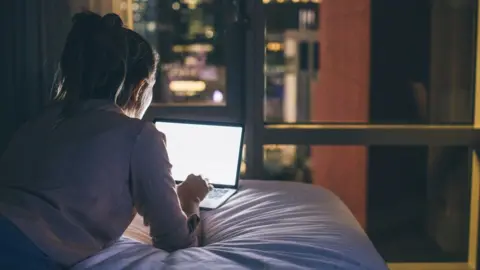Sleep tips: Six ways to boost the chances of a good night's rest
 Getty Images
Getty ImagesExperts have found more evidence of the harm caused by disrupting our body clocks, linking it to depression and bipolar disorder among other things.
The paper's authors say it's a warning to societies becoming less in tune with the body's natural rhythms, which influence not only when we feel sleepy but a range of other processes in the body.
So what are the things we can do to stack the odds in our favour for a good night's sleep?
Limit evening light
Are you inseparable from your mobile phone or laptop? Do you binge-watch box sets or check your social media late into the night?
If so, you're likely to be disrupting your sleep.
That's because these devices produce powerful blue light that delays when we feel sleepy by blocking the release of melatonin - the hormone our body produces to signal it's time for sleep.
Having a cut-off time for when you stop using these devices of an hour and a half before bed is ideal, says Prof Malcolm von Schantz, from the University of Surrey.
Failing this, using blue-light blocking sunglasses and apps that lower the amount of blue light your devices produce in the evening can also help.
While blue light in the evening is particularly bad for our sleep, we should also limit other forms of electric light after sunset.
This can be done by using lamps and keeping our bedrooms dark, for example with blackout curtains.
Be consistent
It may be tempting to stay up late on Friday or Saturday, but ideally we should go to bed at similar times throughout the week.
This helps to reduce social jetlag - the mismatch between when we sleep during the working week compared with the weekend.
The bigger the jetlag the more harmful it is for health, including increased risk of heart disease and other metabolic problems.
 Getty Images
Getty ImagesBut what about ditching the weekend lie-in?
Prof Von Schantz says this is a bad idea because if you want a lie-in it's a sign you need to catch up on sleep.
Make your bedroom a place of rest
Easily portable computers and phones have transformed our bedrooms from sanctuaries of rest into places of entertainment.
But if we want to boost our chances of a good night's rest we need to reclaim them for sleep, experts say.
To do this we should keep phones, laptops and computers in other rooms, and consider investing in an alarm clock so that you don't need to have your phone near your bed.
Keeping your bedroom cool is also important because it's easier for our bodies to sleep in colder temperatures.
Get morning Sun
Our body clocks are designed to follow the rise and fall of the Sun, but many of us don't get enough light in the morning and have too much of it after sunset.
Making it a priority to get some morning Sun - for example, by opening curtains to let in as much light as possible or going for an early morning run - can help us to feel sleepier at earlier times.
If you can't get morning light, either because of where you live or because it's a dark winter's day, light boxes, often used for seasonal affective disorder, can also be effective.
Have a pre-bed routine
Having a pre-bed routine helps signal to our bodies that it's time for sleep, Dr Ben Carter, from King's College London, says.
Activities such as reading a book, listening to a podcast, or having a bath, can help to mentally unwind and get us ready for bed.
 Getty Images
Getty ImagesDr Carter says: "Parents do this with their child to get good sleep.
"They have a set routine where they feed them, they bath them, they put them into bed, there's nothing around them and then they read them a story.
"Having a lack of routine is not going to help you get to sleep."
Having our dinner at a similar time, ideally a few hours before bed, can also boost our chances of a good night's sleep.
Avoid caffeine
Most of us realise that a late-night coffee can make it hard to fall asleep at night.
But what you may not know is that caffeinated drinks - including tea and many fizzy drinks - can make it hard to get a good night's slumber even if you have them earlier in the evening.
That's because caffeine can stay in the system for five to nine hours.
What about a night tipple?
Yes, this is point seven, but does it actually help us sleep?
A glass or two of wine, or a sip or two of brandy, for many is a pre-bed ritual.
But despite what you might think, experts say that a tipple before bedtime actually doesn't improve our sleep.
Prof Schantz adds: "Alcohol has a weird effect in that it makes it easier to fall asleep, but it makes it harder to stay asleep and it affects the quality of our sleep."
